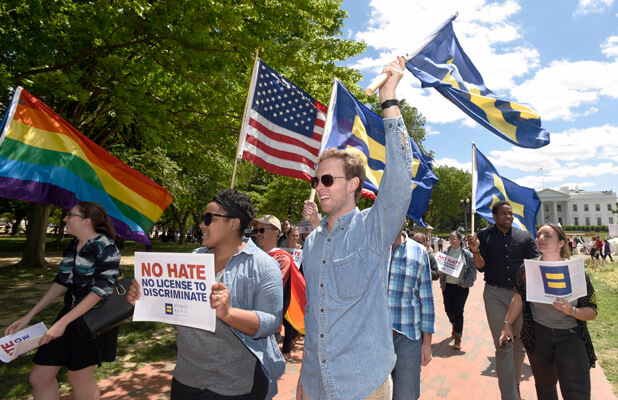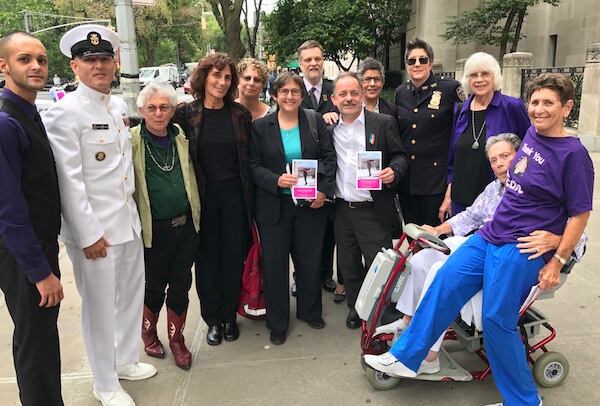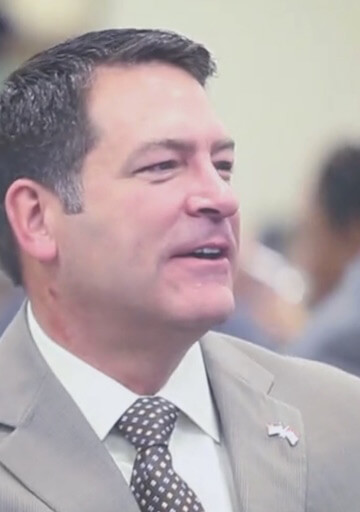Hundreds of advocates rallied in Lafayette Park on May 3, protesting a prospective anti-LGBTQ executive order from the Trump White House. | STEVE RUARK/ ASSOCIATED PRESS FOR HUMAN RIGHTS CAMPAIGN
LGBTQ rights advocates – joined by defenders of women’s health and reproductive freedom – are sounding the alarm about a widely anticipated May 4 executive order from President Donald Trump strengthening the ability of religious organizations and their affiliates as well as other institutions and individuals to claim religious beliefs as a shield to engage in discrimination.
According to Sarah Warbelow, legal director at the Human Rights Campaign (HRC), “every indication” suggests that Trump is preparing to issue an order creating a “sweeping license to discriminate” against LGBTQ people, as well as against the right of women to receive reproductive health care, including access to contraceptives, and even against unmarried couples and single parents.
That conclusion is based on a reading of an earlier draft of an executive order leaked by a White House official and first reported in The Nation in February. A May 2 story in Politico said two unnamed senior White House officials confirmed the order would come down on Thursday and quoted an influential social conservative as saying the executive order had not been substantially changed since February.
“The language is very, very strong,” that source told Politico.
Warbelow cited a number of ways in which an executive order of the type floated earlier in the year could harm LGBTQ Americans. Religiously-affiliated organizations receiving federal funding – or perhaps even a closely-held business getting such money – could deny services to LGBTQ people based on a religious claim, meaning a women’s domestic violence shelter might reject a transgender client while maintaining its contract with the federal government. A nursing home, she said, could similarly refuse to treat a transgender client consistent with their gender identity and a housing program for homeless youth could conduct so-called sexual orientation conversion therapy or force trans youth to sleep in accommodations consistent with the gender they were assigned at birth rather than their gender identity.
The draft order leaked in February would also afford employees of the federal government and of organizations doing business with the government special religious rights. No government worker could face sanctions on the job for discriminatory conduct they engaged in outside the job, and the right to express religious views on the job – including anti-gay proselytizing, Warbelow said – would be protected among federal employees as well as those of government contractors.
Joining Warbelow on a May 3 press call was Brigitte Amiri, a senior staff attorney in the Reproductive Freedom Project at the American Civil Liberties Union (ACLU). Amiri warned that any health care provider, including hospitals and universities, under the February draft executive order, would be free to deny the services guaranteed under the Affordable Care Act’s women’s preventive care provisions, including access to contraceptives.
Both Amiri and Warbelow emphasized that religious objections to single parents raising children and couples living together outside of marriage would also be privileged under the Trump order circulated in February.
The ACLU and HRC, as well as groups including Lambda Legal have already announced they are prepared to go to court immediately to fight any Trump order with objectionable provisions. Asked whether standing would be an issue – that is, whether an individual plaintiff harmed by the order would need to be found – both Warbelow and Amiri asserted that would not constrain speedy action by advocates.
“You don’t need injury,” Warbelow said. “An order like the February draft is facially discriminatory. The likelihood of harm is manifest.”
A challenge to any anti-LGBTQ provisions would be waged on equal protection grounds, she added. Supreme Court Justice Anthony Kennedy’s opinion in the 1996 Romer v. Evans case, which threw out a Colorado voter initiative that barred that state and its localities from enacting gay rights protections, established that animus can never be the basis for creating government policy.
“The leaked memo makes clear that it is based on animus toward the LGBTQ community,” Warbelow said.
Under the existing federal Religious Freedom Restoration Act, enacted in 1993, claims of exemptions from statutes must be weighed against the government’s compelling interest embodied in its laws and policies. Warbelow argued that the executive order envisioned in February assumes that the government never has a compelling interest in preventing discrimination against the LGBTQ community.
Amiri said that a First Amendment religious establishment challenge to such an executive order would also be mounted, since the draft seen in February clearly favors one set of religious views over others.
Asked how advocates would respond to an executive order scaled back in its incursion on the rights of LGBTQ Americans or women’s access to health care, Warbelow noted that “virtually every provision of the February 1 leaked memo affects LGBTQ people and women.”
The HRC legal director acknowledged that the group has had conversations with some White House staff as well as federal government agency officials since word of the new push for an executive order surfaced this week, but said, “I’m not at liberty to discuss” them.
HRC and other LGBTQ advocacy groups rallied on May 3 in Lafayette Park opposite the White House to pressure the Trump administration to hold back from any pernicious action the following day.
The executive order Trump is expected to issue on Thursday would come as he hosts conservative religious leaders to mark National Prayer Day. Late in the day on May 3, the New York Times reported that it was “unclear” if that order would in fact be related to the specific subject matter of February’s leaked memo. According to the Times, what is likely is an order that attempts to circumvent existing federal tax code prohibitions on tax-exempt religious organizations endorsing political candidates.




































